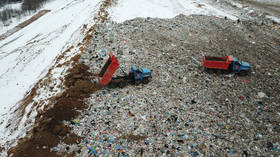Russia to impose ban on cotton swabs and plastic utensils as country begins crackdown on hard-to-recycle & non-recyclable products

The Russian government is to ramp up its focus on non-recyclable products, with a deputy prime minister revealing that the authorities are planning to impose a ban on certain plastics, such as cotton swabs and disposable utensils.
Victoria Abramchenko was speaking to the Nevsky International Ecological Congress, an environment-focused meeting in St. Petersburg.
“We are preparing amendments to ban the use of non-recyclable and hard-to-recycle materials such as colored plastic, plastic tubes, cotton swabs, and disposable plastic utensils,” Abramchenko said.
Also on rt.com 'Mind-boggling for May’: Global warming continues to hit Russia hard as country records 30 degrees Celsius inside Arctic CircleThe deputy PM also revealed her hope that recycling in Russia could create up to $1 trillion a year in added value by 2025, and 100,000 new jobs by 2030.
Last year, a government audit revealed that just 7% of all waste in Russia is recycled, with more than 90% being sent to landfill sites. This is despite President Vladimir Putin’s colossal waste disposal reform project, which came into force in 2019. The new system aims to promote recycling and the sorting of trash, both of which are not very popular in Russia.
Abramchenko also promised Russian enterprises that their needs would be taken into account, and that state support would be given to companies that produce the soon-to-be-banned items.
Earlier this week, the deputy prime minister revealed that Russia would aim to make 85% of all packaging in the country recyclable.
Think your friends would be interested? Share this story!













